Do Hawks Hunt At Night? Under The Cover Of Darkness
The hunting behavior of hawks varies depending on their species as their diet also differs. Generally, hawks are excellent predators with keen eyesight, soundless gliding, and patience while hunting. You may usually find them hunting during the daytime, but their eyesight also lowers with the lowering lights.
So, do hawks hunt at night? Yes, but they can hunt in lowlights, not on dark nights. Food scarcity, intense competition, and hot weather during the day may lead them to low-light hunting. Generally, they will use their hearing, smelling, and low-resolution image capabilities to hunt at this time.
In this article, we will discuss which species may show this behavior, and what factors are responsible for this. Keep reading to know more interesting facts regarding this.
Do Hawks Exhibit Nocturnal Hunting Behavior?
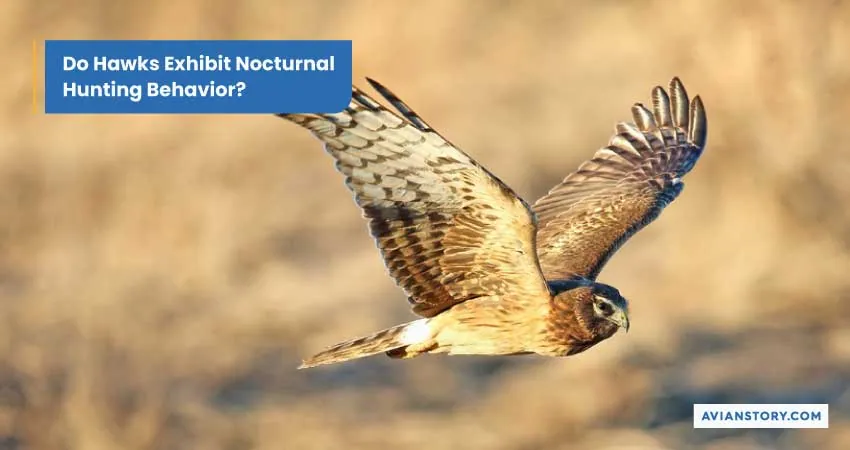
In general, hawks are diurnal birds and are most active in the daytime. During the daytime, you can detect them flying at high elevations to avoid being noticed by their prey. Due to their excellent eyesight, they can keep their eyes on their prey even from a long distance.
Generally, upon comparing hawk vision vs human vision, you will find that they have 7-8 times better eyesight than humans. They can even detect ultraviolet rays.
Usually, after detecting any potential prey, they wait for the appropriate time to attack those prey. Getting the proper chance, they will glide down swiftly without making any sound and will attack their prey with talons. Sometimes, you may find them screeching while hunting.
But why do hawks screech while hunting? Normally, they do so to scare away other hawks when they find any other hawks near them while hunting.
Do they hunt at night?
Usually, they will complete their hunting before dusk and will come back to their nest before nightfall. They aren’t nocturnal and the nighttime is for hawks nesting. In rare cases, you may find them hunting at dusk or dawn time when the light is lower.
They are completely blind when it’s completely dark. Hence, if they hunt at low light, they will mostly depend on their hearing and smelling sense to prey. This is a rare circumstance and will mostly occur during migration, or when they find good prey options.
What Factors Influence Hawks To Hunt At Night?
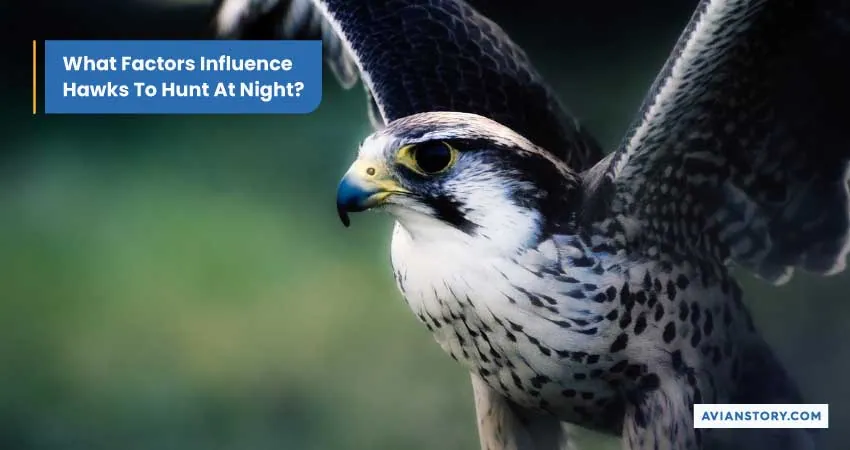
As we already mentioned, this predatory bird mostly hunts during the daytime and has poor eyesight in the dark. Yet, in twilight or moonlit night, you may find them hunting, though this is a rare case. Some factors that will influence this behavior are:
Opportunistic Behavior
One of the most interesting hawks facts is they are opportunistic hunters. Thus, you will find them exploiting any available food source whenever they find a great opportunity.
While perching on trees, if they detect any easy-to-catch prey item at night, they may seize the opportunity. Regardless of their natural diurnal behavior, they will hunt that animal.
Environmental And Seasonal Influences
You will also find them modifying their hunting patterns due to extreme environmental conditions like extreme heat or humidity. Preying when the temperature is low during the night will be more energy efficient for them. Hence, they will be able to secure their food and conserve their energy.
Also, during summer, they get more time during the day to hunt. Yet, during winter, the daytime is relatively less and it will reduce their opportunity to get enough prey for their survival. Thus, they will tend to hunt during dusk and dawn or on moonlit nights to get enough food sources.
Prey Availability And Activity
You will see hawks hunting at night if their preferred prey is more active during nighttime. Generally, their diet list will vary depending on the type of hawks. Some of their prey may be nocturnal and won’t come outside rather than nighttime.
For example, some may prey on rodents or bats which are nocturnal. That’s why the predatory bird will predate during the night. Also, during the night, they can easily hide and remain unnoticed by their prey.
Survival And Competition Factor
When competition for food may become intense due to a large number of hawks in areas. Thus, some of them may choose to hunt at night to avoid the competition. Hence, their chance of getting prey without interference from any other hawks will also increase.
Migration
During migration, hawks will fly long distances, and will sometimes stop for rest. But when do hawks migrate? Generally, you may find them to migrate in October or September to mid-November.
During this time, they might hunt at night to obtain enough food for their survival and sufficient nourishment for their journey.
How Do Different Species Of Hawks Approach Night Hunting?
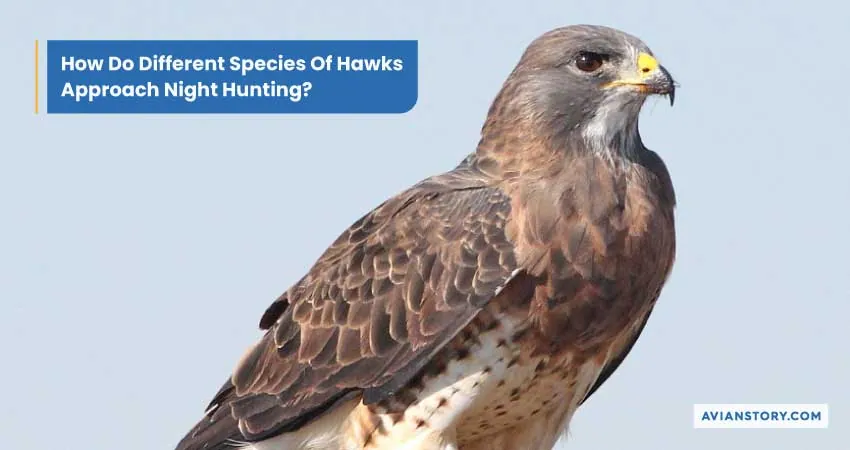
Generally, most hawks are primarily diurnal predators; they rely on their visual acuity. Though some of the species may hunt at low light, their proficiency won’t be as great as during daytime hunting.
Also, you must know that during nighttime, their predators can also prey on them. But what animal eats a hawk? Mostly, raccoons, foxes, eagles, owls, corvids, etc are the potential predators of them.
Besides, if you compare hawks vs owls or hawks vs falcons, hawks have lower eyesight during the dark than the other two. Thus, hunting at night is risky and less effective for them.
Here are some species of this predatory bird which most likely to hunt in low light:
1. Northern Harrier: You may detect this species during dawn and dusk time as they are more active then. They have a distinctive facial disk that helps funnel sound to their ears. This enables them to locate prey even in low light. Their eyesight is also adapted for low-light conditions, allowing them to see well during twilight.
2. Rough-legged hawk: This species will sometimes hunt during dawn or dusk from a perching or hovering position.
3. Red-tailed hawk: Generally, this hawk can see black and white pretty well even in lowlights. That’s why they can detect the movement of their prey easily during dusk.
4. Letter-winged kites: This is the only species that you may find hunting during the night. They have adaptive eyes that can detect the movement of their prey in the dark.Yet, most likely, you can only find them hunting during moonlit nights. Because in complete darkness, unlike predators like owls, they can’t hunt.
Apart from these, all other species of hawks like copper hawks, red-shouldered hawks, Harriers, etc. are primarily diurnal. The cooper species have specialized head movement which helps them to detect their prey even in forest regions.
But you can also find them all to prey till dusk which shows their crepuscular behavior.
What Techniques Do Hawks Use When Hunting At Night?
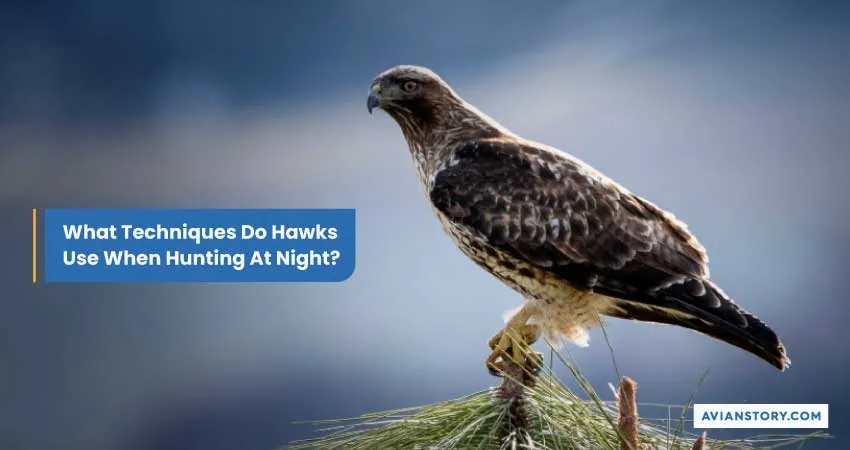
At night, hawks use the following techniques to catch their prey:
Adaptations For Nocturnal Hunting In Hawks
Hawks that will hunt in lowlights will rely on their special hearing and night vision to locate and track prey. They have specialized adaptations such as :
- Larger eye orbit with a higher density of rod cells. These cells are more sensitive to light and will allow them to accumulate as much available light as possible to see in the dark.
- If you notice the CT scanning of their brain, you will find that they have larger orbits from their optic foramen. Optic nerves usually pass through the hole of the foramen.
Thus, this nerve will transfer a lot of information to their brain to form images of high contrast and low resolution.
- Their auditory system is also well-developed and tuned to detect the faint and minor sounds made by their prey.
- Unlike other birds, they also have a strong sense of smell on which they can rely to detect their prey.
Techniques Employed In Nocturnal Hunting
While hunting in lowlights, they will follow these types of strategies:
- Surprise Attacks: They depend on their agility and silent glide to approach their prey and for surprise attacks. Minimizing any sound increases their chances of capturing prey.
- Perching And Scanning: During night hours, you won’t find them flying in a circular motion over any area. Instead, you may notice them perching on elevated places such as poles or treetops.
From there, they will scan the area for movement. Upon spotting a target, they will swoop down to capture it.
- Utilizing Moonlight Or Artificial Lights: Hawks that hunt during the night will take advantage of artificial light or moonlight. These increase their visibility and activity in hunting.
- Targeting Nocturnal Prey: During dark hours, the hawks mainly focus on nocturnal prey. Targeting any diurnal species will reduce their chances of hunting success.
Likewise, during night hours, even if they hunt, they will mostly depend on their hearing and smelling capabilities to detect their prey. Some species like red-tailed hawks and letter-winged kites, have adaptive eyesight with dark periods.
Yet, in daytime hunting, they primarily depend on their keen eyesight for detecting prey. Also, if you compare their success and efficiency in hunting, they are more excellent hunters in the daytime than in the night hours.
How Does Night Hunting Affect Hawk Feeding Patterns?
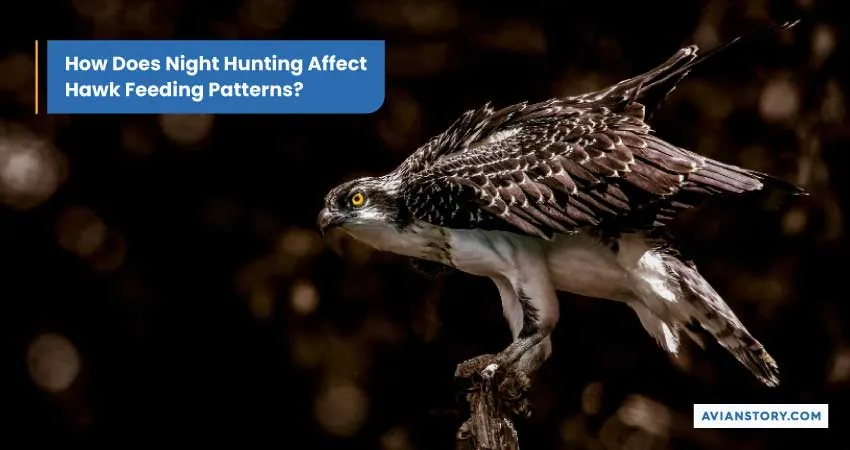
Night hunting will cause a different diet composition than the diet composition of hawks that hunt during the day. Generally, night-hunting hawks focus on nocturnal animals while the diurnal ones target diurnal species.
That’s why you may also find the nutrients, and energy difference in their food consumption.
- While night hunting, they may prey on small mammals like bats and rodents that come out at night. Thus, diurnal hawks will get a lower chance to hunt these prey.
- Accordingly, if any hawks hunt both at night and during the daytime, they will be able to get more food. Upon the food availability, their feeding frequency and quantity both will increase.
- Generally, they eat 2-3 times a day when they hunt in the morning and afternoon. Thus, if they also hunt during the night, they will get a chance to eat more.
- Yet, hunting only at night may increase their metabolism as they need to use their hearing, sensing, and low-light visibility.
- Besides, their proficiency in hunting will be lower; alongside, they may need to eat more. Hence, if they can’t get enough food, this will be a problem for them.
What Role Does Night Hunting Play In Hawk Survival And Adaptation?
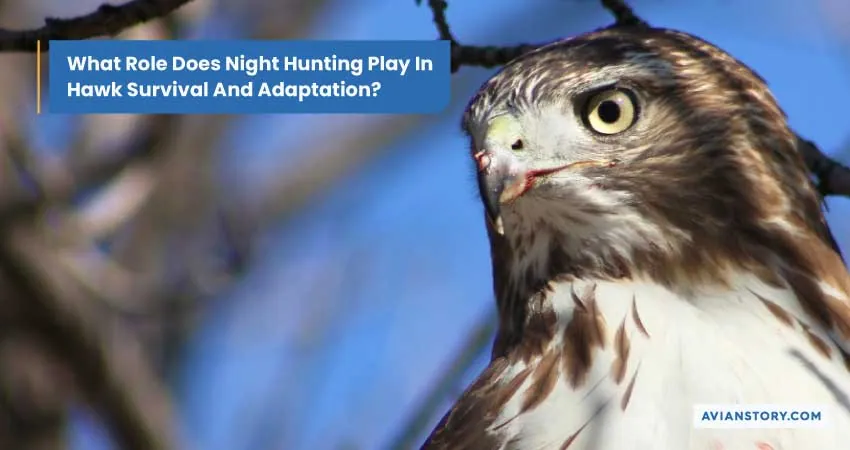
Night hunting plays a crucial role in the survival and adaptation of this predatory bird. Let’s see some of their roles in this regard:
Night Hunting As A Survival Strategy
Hunting at night hours sometimes helps this predatory bird to survive. If the food source is scarce and the competition is intense, night hunting is suitable for them.
- By hunting at this time, hawks have access to a greater density and variety of prey that are not available during day time.
- Hunting during night hours will help them to avoid overheating and preserve the energy for chasing.
- By hunting during the night, they rely on different prey species that are active at night, which reduces hawks vs eagles or other raptors’ competition.
- Also, partitioning the available prey in terms of time helps hawks to coexist with diurnal predators effectively.
Impact of Night Hunting on Hawk Lifespan and Reproduction
Night hunting has both positive and negative impacts on their lifespan and reproduction.
- Hunting during night hours will increase the chance of getting nocturnal prey. Alongside, those diurnal species that have low visibility at night will also be a great potential for hawks to prey on.
This availability of food will ensure better chances of their raising offspring and ensuring their survival.
- Availability of food also increases the chances of successful hawk breeding and the sound health of their offerings.
- Night-time hunting also exposes them to their nocturnal predators. They also have diurnal predators, but during the night, their proficiency to deal with the attack is lower. Thus, this is a greater risk to their longevity.
- Also, you may notice them getting injured while competing with other nocturnal predators of their prey. Sometimes the injury can be too severe which will lead to death.
Conclusion
You won’t find all hawks hunting at night times; a few species can do so if there is low light available. We already discussed do hawks hunt at night. Hunting at night will increase their availability of nocturnal prey. Also, it reduces their competition with inter-species or extra-species predators.
Besides, the cooler weather helps them to preserve energy while flying at night. Also, hunting at night can reduce their longevity as they get exposed to their nocturnal predators. During the nighttime, as their eyesight gets poor, it becomes difficult for them to defend the attack from their predators.
